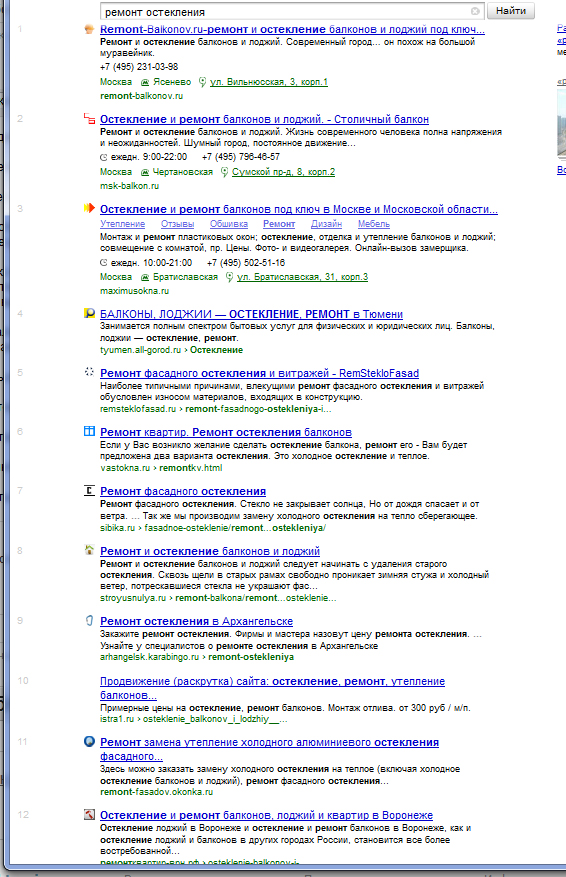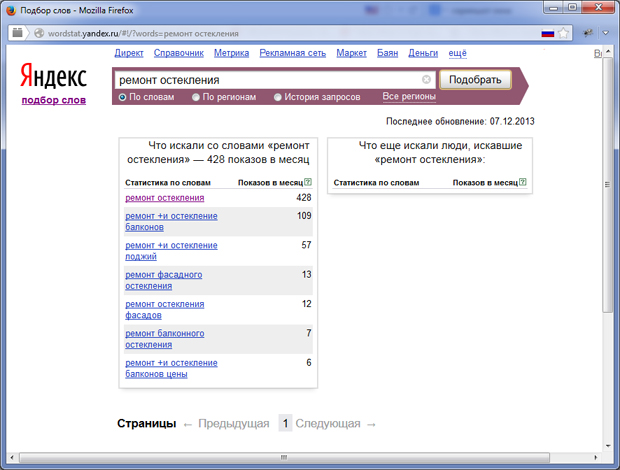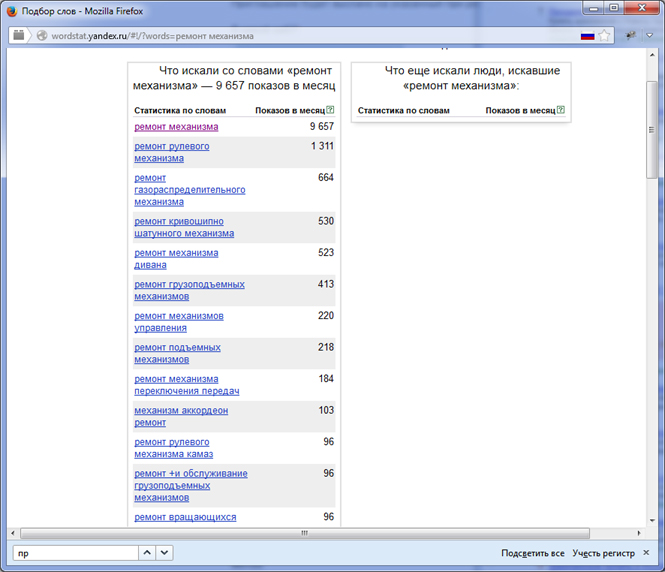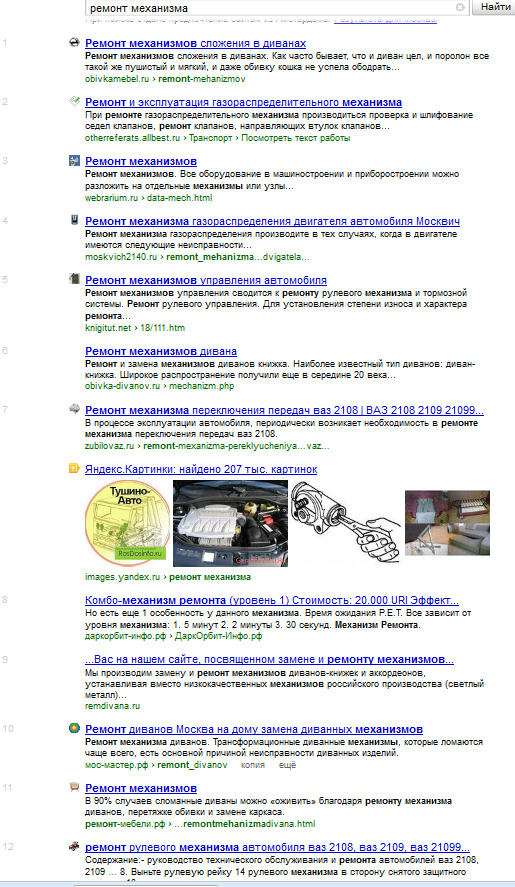How the “non-referential” ranking factors of Yandex work - an attempt to analyze
Update as of January 23, 2014. This article was written on December 30th last year. Extradition has changed since then, but by and large the information provided is relevant. Since then, some more data has appeared, however, on the one hand, there are too many to expand this article - and too little for a new one on the other. If the post arouses the interest of the community, it is likely that after the accumulation of information there will be a continuation related to the characteristic features of the factors not mentioned here.
A warning. The following should not be taken as accurate information - this is only a guess, confirmed empirically.
Warning 2. Perhaps this information is news only in my “swamp”, but a search on the net did not yield any results that were somewhat similar to these conclusions.
Everyone, more or less related to the Internet, knows how high it was when Yandex announced that it was refusing a reference in NG.
')
On the one hand, it will be easier to live - without the search rubbish, the world will be a little cleaner, on the other hand, it is not clear how this will be realized and for whom it will hit (well, except for optimizers, copywriters and other brethren, of course, but figs with them).
Since I am engaged in, among other things, advertising on the Web, I began to look at the positions of the sites of my clients, as well as competitors, with tension. The results of the issue for the holidays were becoming more and more strange. Obviously, the non-referential factors gradually increased - and therefore the issue for some requests became rather unusual.
I tried to understand the logic of the algorithm and it seems that it was partially possible. Although, if my assumptions are correct, many, dependent on sales through the network, frankly, difficult times are waiting.
Yes, and users will not be easier.
Those in a hurry: a brief summary is at the end of the article.
The rest I propose to fully trace the train of thought and correct the mistakes that I may have made.
I was interested in the request "repair of glazing", which is associated with the services of some companies with whom I cooperate.
The results on it through anonymous calling are:

I must say, the data caused surprise. I explain. Pay attention to the nature of the sites in issue. For the first 12 places there are 9 loggia balconies. Under the “old regime”, this request was usually fought by large companies dealing with corporate orders, such as the repair of glazing on the facade of a building. It so happened that this request was relevant specifically for b2b, and the main percentage of users, judging by practice, was from this area. For private owners, this request was not very typical. They usually formulated their request more clearly - after all, they had a particular balcony, and not a “glazing”.
The statistics of requests in the directory is as follows (here we had to give up anonymity - we need a login):

As you can see, most of them just have a “glazing” as an object. However, when I looked at the results, I was visited ...
Please note: the word "glazing" can be understood in Russian in two ways. On the one hand, this word may denote an object. "Glazing" in the professional jargon of builders is the glazing of the entire building as a whole. On the other hand, the phrase "glazing repair" can be perceived as an incomplete phrase.
But the task of the search engine is to find what the user wants! Most of those who specified the request wanted balconies / loggias. Maybe this is why this topic got up? Is it possible that during the search there was a “hidden” query refinement similar to the hint line of popular queries?
I mean, is such a mechanism possible: Yandex completes the request "in mind" and proceeds from the expectations it builds the issue?
Should have checked. For this, I needed the same "unfinished" request.
Let it be "buy champagne." Direct reported the following:

Please note - requests from end users set the tone - broken down by brand, but wanting the same thing. But a significant part (though not the majority!) Of users is interested in wholesale.
What do we have in search? Here's what:

4 and 12 places took the wholesale, despite the fact that most users, according to requests, are of little interest, but the number of clarifying requests is large.
Bingo?..
However, a counter-argument was immediately found: the request “repair of the mechanism”.
Direct:

Issuance:

The ratio of sofas to cars in the first dozen issue: five to five.
If you calculate the furniture theme in the direct, which did not fit into the screenshot, there will be more sofas, of course, this will remain the second most popular theme, but it still doesn’t draw on a one-to-one ratio!
Why?
The assumptions are as follows:
1) The usability factors, the Pension Fund and others, which the Bolsheviks have been talking about for so long, that is, Yandex, are starting to work. A pronounced focus on work through a network of "furniture" sites is striking. Similarly, in the query "poisonous gland" in Yandex, the encyclopedia on WoW is in the lead, and not biology manuals at all!
2) Heterogeneity of "automotive" and "technical" requests for furniture. They all want a sofa, and here is KAMAZ, the steering wheel, the transmission.
3) The assumption is probably too arrogant, but there is also such a possibility, and a large one: the pages that respond to "automotive" inquiries are not necessarily commercial. Moreover, these are often informational materials - it happens, it is true that they are posted on commercial sites, but posing as informational ones. At the same time, the issue of furniture is a pronounced commercial character. Accident? It is possible that this acts “usability” (what it means from the point of view of Yandex is a mystery), which is higher in commercial sites than in informational sites. But maybe not. I could not form an accurate opinion on this issue - as long as the statistics are too low.
Further testing of various queries more or less brought the theory to a single mind. So…
1) The top of the issue of Yandex is formed taking into account what you were looking for with these words (request, I mean) earlier. Positions and the number of topics presented in the top of the issue correlate with this characteristic, although it is impossible to establish an exact relationship - other factors work as well.
2) One of these factors, perhaps (?), Is the commercial / informational orientation of the site - perhaps in favor of the first one, but there is still not enough information for an unequivocal conclusion.
3) The popularity of the subject covers logic - upon request of the “poisonous gland”, the encyclopedia of vocabulary is higher than the dictionaries and encyclopedias of the IRLs. In addition, the popularity of the subject matter is more important than the popularity of the request - the "poisonous gland of the death-blower" is an unpopular request, judging by the directive.
4) The above has both advantages and disadvantages from the point of view of the searcher and site owner. IMHO more minuses.
Pros:
From the point of view of the owner:
Part of the audience, passing by due to inaccurate request, will come to him.
From the user's point of view:
Incomplete or ambiguous request has a good chance to give the necessary info
Minuses:
From the user's point of view:
If an ambiguous request is made, such as “glazing repair”, where “glazing” can be considered as a separate word and the beginning of a word combination, he has chances to get info that is interesting not for him, but for the majority, and for the rather conventional majority, calculated incorrectly, the requests of those for whom this is the beginning of expression (and it will not occur to the real majority and clarify it, for them this is a complete phrase!).
For the site owner:
If in the case described above, it is about the low-frequency, due to which the company only lives (as many in the b2b realm), it can very seriously hit the flow of customers from the Internet. It turns out a double competition - both with sites of relevant topics and irrelevant, moreover, on obviously unequal conditions: to enter the top three or the seven is a big difference. Under the “old regime”, this risk was compensated for by reference (the correct usage of the referring sites worked), but in its absence, the present Babylonian mixing turns out, with very small chances of getting to its users.
Will it kill Yandex? Not. Will it make it better? Also no.
I hope that the information presented in this attempt to investigate the non-referential factors of Yandex ranking was, if not useful, then fascinating (naive, yes?).
Introduction
A warning. The following should not be taken as accurate information - this is only a guess, confirmed empirically.
Warning 2. Perhaps this information is news only in my “swamp”, but a search on the net did not yield any results that were somewhat similar to these conclusions.
Everyone, more or less related to the Internet, knows how high it was when Yandex announced that it was refusing a reference in NG.
')
On the one hand, it will be easier to live - without the search rubbish, the world will be a little cleaner, on the other hand, it is not clear how this will be realized and for whom it will hit (well, except for optimizers, copywriters and other brethren, of course, but figs with them).
Since I am engaged in, among other things, advertising on the Web, I began to look at the positions of the sites of my clients, as well as competitors, with tension. The results of the issue for the holidays were becoming more and more strange. Obviously, the non-referential factors gradually increased - and therefore the issue for some requests became rather unusual.
I tried to understand the logic of the algorithm and it seems that it was partially possible. Although, if my assumptions are correct, many, dependent on sales through the network, frankly, difficult times are waiting.
Yes, and users will not be easier.
Those in a hurry: a brief summary is at the end of the article.
The rest I propose to fully trace the train of thought and correct the mistakes that I may have made.
Formulation of the problem
I was interested in the request "repair of glazing", which is associated with the services of some companies with whom I cooperate.
The results on it through anonymous calling are:

I must say, the data caused surprise. I explain. Pay attention to the nature of the sites in issue. For the first 12 places there are 9 loggia balconies. Under the “old regime”, this request was usually fought by large companies dealing with corporate orders, such as the repair of glazing on the facade of a building. It so happened that this request was relevant specifically for b2b, and the main percentage of users, judging by practice, was from this area. For private owners, this request was not very typical. They usually formulated their request more clearly - after all, they had a particular balcony, and not a “glazing”.
The statistics of requests in the directory is as follows (here we had to give up anonymity - we need a login):

As you can see, most of them just have a “glazing” as an object. However, when I looked at the results, I was visited ...
Guess
Please note: the word "glazing" can be understood in Russian in two ways. On the one hand, this word may denote an object. "Glazing" in the professional jargon of builders is the glazing of the entire building as a whole. On the other hand, the phrase "glazing repair" can be perceived as an incomplete phrase.
But the task of the search engine is to find what the user wants! Most of those who specified the request wanted balconies / loggias. Maybe this is why this topic got up? Is it possible that during the search there was a “hidden” query refinement similar to the hint line of popular queries?
I mean, is such a mechanism possible: Yandex completes the request "in mind" and proceeds from the expectations it builds the issue?
Should have checked. For this, I needed the same "unfinished" request.
Check
Let it be "buy champagne." Direct reported the following:

Please note - requests from end users set the tone - broken down by brand, but wanting the same thing. But a significant part (though not the majority!) Of users is interested in wholesale.
What do we have in search? Here's what:

4 and 12 places took the wholesale, despite the fact that most users, according to requests, are of little interest, but the number of clarifying requests is large.
Bingo?..
Bummer
However, a counter-argument was immediately found: the request “repair of the mechanism”.
Direct:

Issuance:

The ratio of sofas to cars in the first dozen issue: five to five.
If you calculate the furniture theme in the direct, which did not fit into the screenshot, there will be more sofas, of course, this will remain the second most popular theme, but it still doesn’t draw on a one-to-one ratio!
Why?
Refinement of the hypothesis
The assumptions are as follows:
1) The usability factors, the Pension Fund and others, which the Bolsheviks have been talking about for so long, that is, Yandex, are starting to work. A pronounced focus on work through a network of "furniture" sites is striking. Similarly, in the query "poisonous gland" in Yandex, the encyclopedia on WoW is in the lead, and not biology manuals at all!
2) Heterogeneity of "automotive" and "technical" requests for furniture. They all want a sofa, and here is KAMAZ, the steering wheel, the transmission.
3) The assumption is probably too arrogant, but there is also such a possibility, and a large one: the pages that respond to "automotive" inquiries are not necessarily commercial. Moreover, these are often informational materials - it happens, it is true that they are posted on commercial sites, but posing as informational ones. At the same time, the issue of furniture is a pronounced commercial character. Accident? It is possible that this acts “usability” (what it means from the point of view of Yandex is a mystery), which is higher in commercial sites than in informational sites. But maybe not. I could not form an accurate opinion on this issue - as long as the statistics are too low.
Further testing of various queries more or less brought the theory to a single mind. So…
Findings:
1) The top of the issue of Yandex is formed taking into account what you were looking for with these words (request, I mean) earlier. Positions and the number of topics presented in the top of the issue correlate with this characteristic, although it is impossible to establish an exact relationship - other factors work as well.
2) One of these factors, perhaps (?), Is the commercial / informational orientation of the site - perhaps in favor of the first one, but there is still not enough information for an unequivocal conclusion.
3) The popularity of the subject covers logic - upon request of the “poisonous gland”, the encyclopedia of vocabulary is higher than the dictionaries and encyclopedias of the IRLs. In addition, the popularity of the subject matter is more important than the popularity of the request - the "poisonous gland of the death-blower" is an unpopular request, judging by the directive.
4) The above has both advantages and disadvantages from the point of view of the searcher and site owner. IMHO more minuses.
Pros:
From the point of view of the owner:
Part of the audience, passing by due to inaccurate request, will come to him.
From the user's point of view:
Incomplete or ambiguous request has a good chance to give the necessary info
Minuses:
From the user's point of view:
If an ambiguous request is made, such as “glazing repair”, where “glazing” can be considered as a separate word and the beginning of a word combination, he has chances to get info that is interesting not for him, but for the majority, and for the rather conventional majority, calculated incorrectly, the requests of those for whom this is the beginning of expression (and it will not occur to the real majority and clarify it, for them this is a complete phrase!).
For the site owner:
If in the case described above, it is about the low-frequency, due to which the company only lives (as many in the b2b realm), it can very seriously hit the flow of customers from the Internet. It turns out a double competition - both with sites of relevant topics and irrelevant, moreover, on obviously unequal conditions: to enter the top three or the seven is a big difference. Under the “old regime”, this risk was compensated for by reference (the correct usage of the referring sites worked), but in its absence, the present Babylonian mixing turns out, with very small chances of getting to its users.
Conclusion
Will it kill Yandex? Not. Will it make it better? Also no.
I hope that the information presented in this attempt to investigate the non-referential factors of Yandex ranking was, if not useful, then fascinating (naive, yes?).
Source: https://habr.com/ru/post/210088/
All Articles